- Home
- Jr. Horatio Alger
Bernard Brooks' Adventures: The Experience of a Plucky Boy Page 37
Bernard Brooks' Adventures: The Experience of a Plucky Boy Read online
Page 37
CHAPTER XXXVII. A BAD DAY FOR MR. MCCRACKEN.
|Cornelius McCracken sat in his office in a complacent mood. He had justclosed a successful speculation in Wall Street, by which he had cleareda few hundred dollars. He was not a rich man for the city, and this wasof some consequence to him.
Then his mind could not help reverting to Bernard and the accident whichhad removed him from his path and averted all danger of restitution ofthe boy's fortune. Truly all seemed favorable.
He heard a slight noise at the door, and lifting his eyes recognizedwith a scowl his old ally and confederate, Professor Puffer.
"What do you want here?" he demanded roughly. "I have no time for suchas you."
Professor Puffer entered the room, nevertheless, and sank into a chair.
"Mr. McCracken," he said, "I am very unfortunate. I am reduced to theposition of a sandwich man. I who have occupied the position of agentleman."
"What is that to me? It is an honest way of earning your living. You arelucky to find work at all."
"I have given it up. I can't stand it. Besides, I met yesterdayafternoon a person whom I had known in happier and more prosperous days.I felt as if I should sink through the sidewalk."
"I see--you are poor and proud," sneered McCracken. "It is out of placein a man like you."
"Mr. McCracken, can't you help me? I have served you faithfully in amatter you know of."
"And you have been paid."
"But think how you have benefited. By the boy's death you have fallenheir to his fortune, and----"
"Who told you he had a fortune?"
"You admitted it yourself in a conversation."
"Well, it was very small--a few hundred dollars."
"On that point I will not speak. Even admitting it to be only that,can't you spare me a few dollars?"
"No, I can't. Get out of my office!"
"Mr. McCracken," said Puffer, changing his tone, "you have thrown meover because you think you don't need me any more. Suppose now--onlysuppose--that a mistake had been made--that Bernard was not dead afterall."
"What do you mean?" demanded the merchant nervously. "You told me he wasdead."
"Suppose I was mistaken."
"Then you deceived me basely. But you are only trying to play a trick onme. You have mistaken your man. Again I order you to leave my office."
"I will do so, but I shall return."
"If you do, you will be kicked out."
Professor Puffer did not seem alarmed. He went out, closing the doorbehind him, and immediately afterwards Bernard opened it and went in.
"Didn't I tell you not to come back?" exclaimed McCracken angrily.
"No," answered a young, fresh voice.
Mr. McCracken turned quickly and there stood Bernard Brooks. He hadgrown considerably; he was much improved in dress; but Mr. McCrackenrecognized him.
"I see you know me," said Bernard.
"No, I don't."
"I think you do. I am Bernard Brooks."
"I thought you were dead."
"It was a mistake."
"I am not prepared to admit your identity. You don't look like BernardBrooks."
"I shall have no difficulty in proving myself to be your former ward.".
"Well, what do you want? Do you wish to put yourself under my charge? Inthat case I will send you to Professor Snowdon."
"No, thank you. I can take care of myself."
"I am willing. In that case I will bid you good morning. I am busy," andMr. McCracken made a motion to return to his writing.
"You asked me if I had any business with you. I have," continuedBernard. "I wish you to give up the fortune my father left in yourcharge for me."
"You lie! There was no such fortune. Some one has been deceiving you.Perhaps it is that arrant liar, Ezra Puffer."
"Whom you hired to put me out of the way."
"What do you mean?" asked Mr. McCracken hoarsely,
"I have in my possession a letter which you wrote to him, from which itwill be easy to prove your attempted crime and the motive."
"There is no such letter. I never wrote one of that tenor."
"It is in your handwriting."
"Show it to me, then."
"I can't. It is in the hands of my lawyer."
"You have dared to put it into the hands of a lawyer?"
"I felt that it was my best course."
Cornelius McCracken's countenance worked convulsively. He was beginningto be afraid of his ward.
"There was a matter of five hundred dollars," he admitted reluctantly,"left over after my disbursements for you. I will at my leisure lookover my accounts, and if there is any money due you, you shall have it."
"I have made the acquaintance of Mr. Oliver Franklin, an old friend ofmy father. He tells a very different story. He says my father left atleast ten thousand dollars."
"Stuff and nonsense! You must be crazy."
"I won't discuss the question with you, Mr. McCracken. I have put thematter into the hands of a lawyer, who will see you about the matter. Ionly wished to give you notice what I intended doing. Good morning."
Bernard left the office, leaving his guardian in no enviable state ofmind. Without dwelling on the legal steps taken, it is enough to saythat Mr. McCracken was ultimately compelled to disgorge twelve thousanddollars to his former ward.
Bernard and his English friend succeeded in obtaining for ProfessorPuffer a position as doorkeeper, in an art museum, which, on the whole,he preferred to being a sandwich man.
Before this law matter was terminated Bernard made up his mind to visitDoncaster and see his old friend and teacher, Professor Ezekiel Snowdon.
CHAPTER XXXVIII. CONCLUSION.
|When Bernard left the cars and stepped on the platform of the Doncasterstation, he saw Freedom Wentworth preparing to drive away on a storewagon. "Give me a ride, Freed?" said Bernard.
Freedom Wentworth turned quickly, and seemed at first in doubt. Then hesaid, as his face lighted up, "Why, it's Bernard Brooks."
"The same, Freed. Shall I have the ride?"
"Yes, jump up. Why, you're looking fine. Where do you want to go?"
"To see my old friend, Professor Snowdon. How is he?"
"He isn't flourishing. He has lost half his scholars, and looks awfullyshabby. Are you going to enter his school again?"
"Not much!"
"What are you doing? Are you working?"
"I am living on my money."
"So am I," said Freedom, who thought it a good joke.
"But I am really. I have fifteen thousand dollars."
"You don't say! I won't tell you how much I have, but it isn't quite somuch. Where did you get it?"
"I will tell you later. But who is that ahead of us? Isn't it NatBarclay?"
"Yes."
"Nat!" called out Bernard.
Nat turned and eyed Bernard at first doubtfully. Then he lookedoverjoyed as he recognized his friend. He jumped into the wagon, andsqueezing in between him and Freedom began to ply him with questions.
When they reached the Snowdon Institute Bernard jumped down.
"I'll see you later, Nat," he said.
"Come round to dinner, Bernard."
"I will."
Bernard plied the knocker at Professor Snowdon's front door. Clad in aragged dressing-gown the professor came to answer it. Being shortsightedhe didn't at once recognize Bernard.
"Have you business with me, young gentleman?" he said respectfully,noticing Bernard's handsome attire.
"You don't seem to recognize me, professor."
"Have I seen you before?",
"I am Bernard Brooks."
"Is it possible! You--you seem to be prosperous."
"Yes, Professor Snowdon, the world has used me fairly well of late."
"I am so glad to hear it," said the tutor gushingly. "I always thoughtthat you'd get along in business. You are in business, aren't you?"
"To a certain extent, yes," replied Bernard. "I have fallen heir to so
mefifteen thousand dollars."
"You don't tell me! Dear me, how fortunate! Do you wish to return to theinstitute?"
"No, I think not. I shall live in New York for the present."
"I will take you cheap--very cheap! I always liked you, Bernard Brooks,"and the professor squeezed Bernard's hand between his bony fingers.
"I am glad to hear it, but I thought you didn't. You used to call me abad lot."
"A little harmless joke. I didn't mean it. Here, Septimus!"
Septimus came from the street, eying Bernard with curiosity.
"Septimus," said his father, "this is our old and favorite pupil,Bernard Brooks."
"How do you do, Bernard?" said Septimus, looking surprised.
"Very well, thank you!"
"Why, you're rigged out in tip-top style!" went on Septimus, enviously.
"Septimus," said his father, "you will be glad to hear that our dearyoung friend has come into a fortune."
"Is that straight?" asked Septimus.
"A small fortune," said Bernard, "but I think I shall get my father'smoney besides soon. I am having negotiations with Mr. McCracken."
"Won't you come back here to live?" asked Septimus. "We'll have awfulgood times together."
"Yes," said the professor, "Septimus always loved you like a brother."
"Yes, I did," affirmed Septimus.
"It is pleasant to find you so glad to see me," said Bernard, smiling."I am afraid I can't stay, though. My friend, Mr. Cunningham of London,can't spare me. We shall stay in New York for the present."
"May I come to visit you?" asked Septimus.
"I am not sure that it would be convenient, but if you wish to make atrip to New York on your own account, this will help you to do it," andBernard produced a five-dollar bill, which Septimus seized with avidity.
Later in the day Bernard called on Nat Barclay, and insisted on takinghim to New York for a few days.
"You were my friend when I needed one, Nat. Now I have more than I want.Septimus and his father seem devoted to me."
"It is the way of the world," said Mr. Barclay. "Great is the power ofmoney!"
It is not necessary to follow Bernard further. He is at presentconnected with Princeton College, and I hear is the captain of thefootball team. When he has completed his education he will make a tourround the world with Mr. Cunningham. Even Professor Snowdon does not nowcall him a bad lot, but speaks of him with pride as "my distinguishedand favorite pupil."
"I wonder if the professor remembers when he chased me through the barnwith a horsewhip," Bernard says to himself, with a smile. "I wasn't hisfavorite pupil then."
THE END.

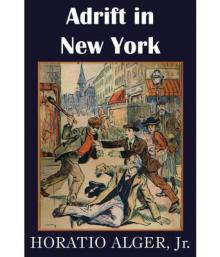 Adrift in New York: Tom and Florence Braving the World
Adrift in New York: Tom and Florence Braving the World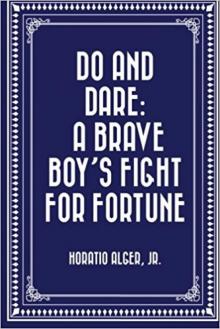 Do and Dare — a Brave Boy's Fight for Fortune
Do and Dare — a Brave Boy's Fight for Fortune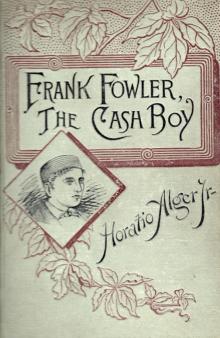 The Cash Boy
The Cash Boy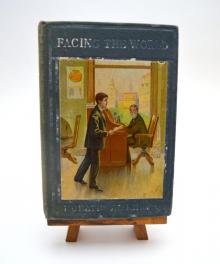 Facing the World
Facing the World The Young Explorer; Or, Claiming His Fortune
The Young Explorer; Or, Claiming His Fortune The Store Boy
The Store Boy Frank's Campaign; Or, The Farm and the Camp
Frank's Campaign; Or, The Farm and the Camp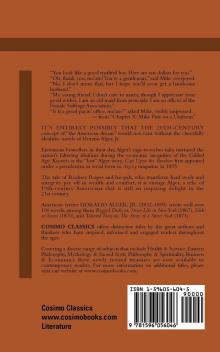 Cast Upon the Breakers
Cast Upon the Breakers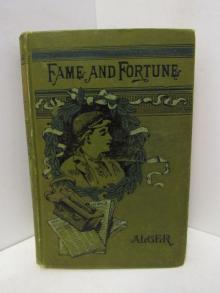 Fame and Fortune; or, The Progress of Richard Hunter
Fame and Fortune; or, The Progress of Richard Hunter The Errand Boy; Or, How Phil Brent Won Success
The Errand Boy; Or, How Phil Brent Won Success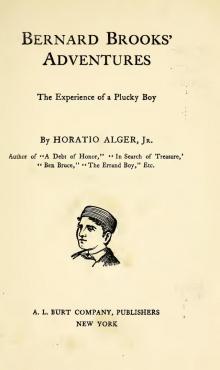 Bernard Brooks' Adventures: The Experience of a Plucky Boy
Bernard Brooks' Adventures: The Experience of a Plucky Boy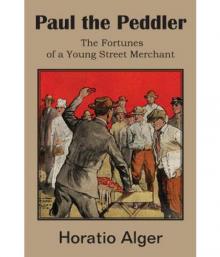 Paul the Peddler; Or, The Fortunes of a Young Street Merchant
Paul the Peddler; Or, The Fortunes of a Young Street Merchant Brave and Bold; Or, The Fortunes of Robert Rushton
Brave and Bold; Or, The Fortunes of Robert Rushton Try and Trust; Or, Abner Holden's Bound Boy
Try and Trust; Or, Abner Holden's Bound Boy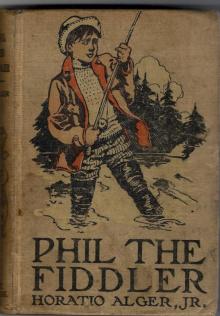 Phil, the Fiddler
Phil, the Fiddler In A New World; or, Among The Gold Fields Of Australia
In A New World; or, Among The Gold Fields Of Australia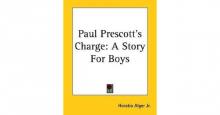 Paul Prescott's Charge
Paul Prescott's Charge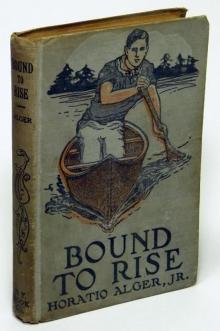 Joe's Luck; Or, Always Wide Awake
Joe's Luck; Or, Always Wide Awake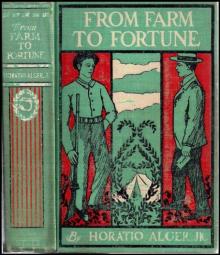 From Farm to Fortune; or, Nat Nason's Strange Experience
From Farm to Fortune; or, Nat Nason's Strange Experience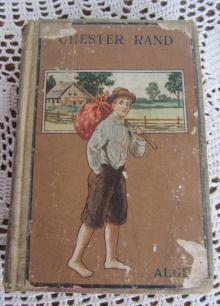 Chester Rand; or, The New Path to Fortune
Chester Rand; or, The New Path to Fortune Driven from Home; Or, Carl Crawford's Experience
Driven from Home; Or, Carl Crawford's Experience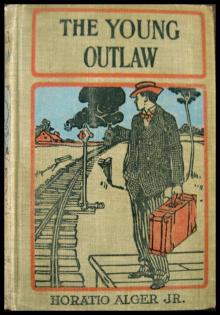 The Young Outlaw; or, Adrift in the Streets
The Young Outlaw; or, Adrift in the Streets Risen from the Ranks; Or, Harry Walton's Success
Risen from the Ranks; Or, Harry Walton's Success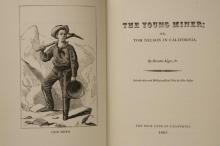 The Young Miner; Or, Tom Nelson in California
The Young Miner; Or, Tom Nelson in California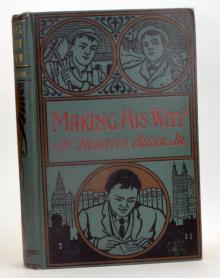 Making His Way; Or, Frank Courtney's Struggle Upward
Making His Way; Or, Frank Courtney's Struggle Upward Ben, the Luggage Boy; Or, Among the Wharves
Ben, the Luggage Boy; Or, Among the Wharves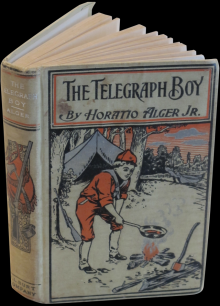 The Telegraph Boy
The Telegraph Boy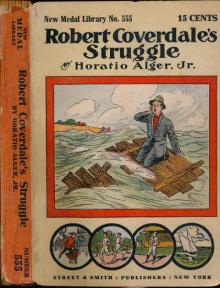 Robert Coverdale's Struggle; Or, on the Wave of Success
Robert Coverdale's Struggle; Or, on the Wave of Success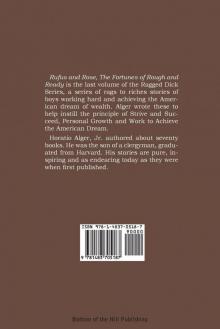 Rufus and Rose; Or, The Fortunes of Rough and Ready
Rufus and Rose; Or, The Fortunes of Rough and Ready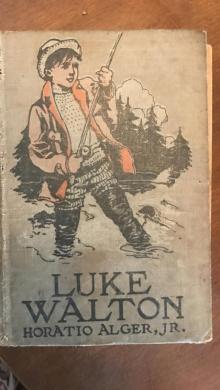 Luke Walton
Luke Walton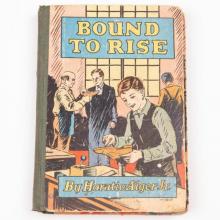 Mark Mason's Victory: The Trials and Triumphs of a Telegraph Boy
Mark Mason's Victory: The Trials and Triumphs of a Telegraph Boy The Young Musician; Or, Fighting His Way
The Young Musician; Or, Fighting His Way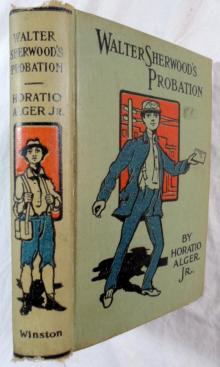 Walter Sherwood's Probation
Walter Sherwood's Probation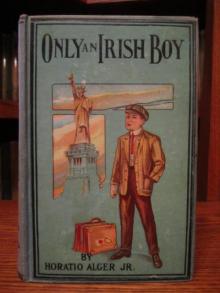 Only an Irish Boy; Or, Andy Burke's Fortunes
Only an Irish Boy; Or, Andy Burke's Fortunes Slow and Sure: The Story of Paul Hoffman the Young Street-Merchant
Slow and Sure: The Story of Paul Hoffman the Young Street-Merchant Herbert Carter's Legacy; Or, the Inventor's Son
Herbert Carter's Legacy; Or, the Inventor's Son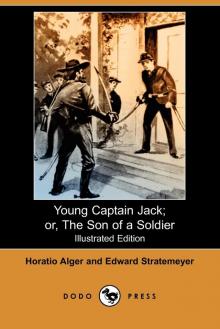 Young Captain Jack; Or, The Son of a Soldier
Young Captain Jack; Or, The Son of a Soldier Timothy Crump's Ward: A Story of American Life
Timothy Crump's Ward: A Story of American Life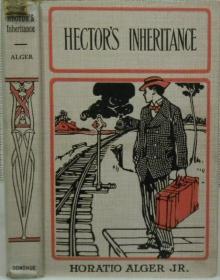 Hector's Inheritance, Or, the Boys of Smith Institute
Hector's Inheritance, Or, the Boys of Smith Institute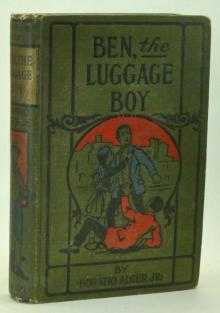 Ben's Nugget; Or, A Boy's Search For Fortune
Ben's Nugget; Or, A Boy's Search For Fortune